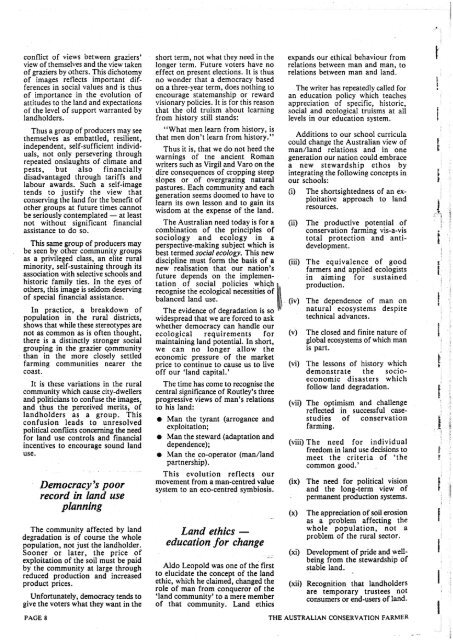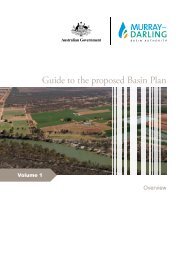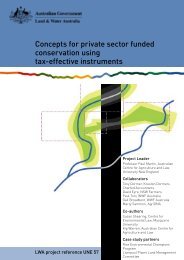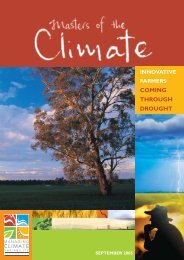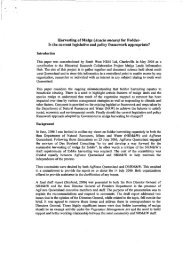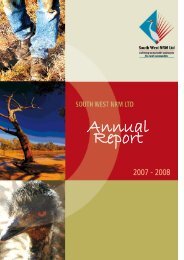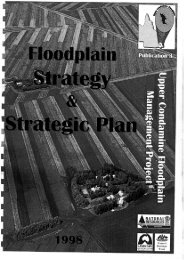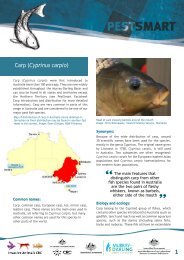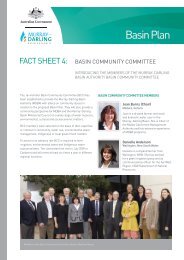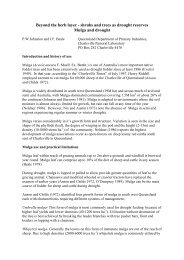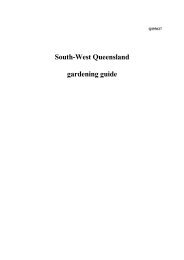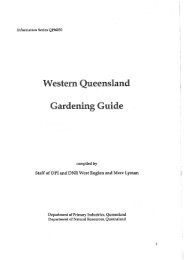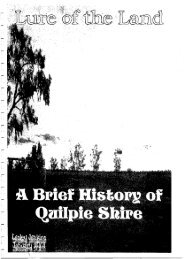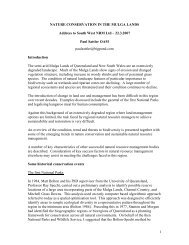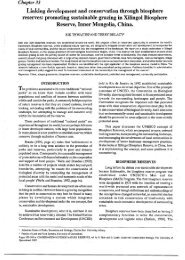soil-conservation-people-religion-and-land.pdf - South West NRM
soil-conservation-people-religion-and-land.pdf - South West NRM
soil-conservation-people-religion-and-land.pdf - South West NRM
Create successful ePaper yourself
Turn your PDF publications into a flip-book with our unique Google optimized e-Paper software.
conflict of views between graziers'<br />
view of themselves <strong>and</strong> the view taken<br />
of graziers by others. This dichotomy<br />
of images reflects important differences<br />
in social values <strong>and</strong> is thus<br />
of importance in the evolution of<br />
attitudes to the l<strong>and</strong> <strong>and</strong> expectations<br />
of the level of support warranted by<br />
l<strong>and</strong>holders.<br />
Thus a group of producers may see<br />
themselves as embattled, resilient,<br />
independent, self-sufficient individuals,<br />
not only persevering through<br />
repeated onslaughts of climate <strong>and</strong><br />
pests, but also financially<br />
disadvantaged through tariffs <strong>and</strong><br />
labour awards. Such a self-image<br />
tends to justify the view that<br />
conserving the l<strong>and</strong> for the benefit of<br />
other groups at future times cannot<br />
be seriously contemplated - at least<br />
not without significant financial<br />
assistance to do so.<br />
This same group of producers may<br />
be seen by other community groups<br />
as a privileged class, an elite rural<br />
minority, self-sustaining through its<br />
association with selective schools <strong>and</strong><br />
historic family ties. In the eyes of<br />
others, this image is seldom deserving<br />
of special financial assistance.<br />
In practice, a breakdown of<br />
population in the rural districts,<br />
shows that while these stereotypes are<br />
not as common as is often thought,<br />
there is a distinctly stronger social<br />
grouping in the grazier cpmmunity<br />
than in the more closely settled<br />
farming communities nearer the<br />
coast.<br />
It is these variations in the rural<br />
community which cause city-dwellers<br />
<strong>and</strong> politicians to confuse the images,<br />
<strong>and</strong> thus the perceived merits, of<br />
l<strong>and</strong>holders as a group. This<br />
confusion leads to unresolved<br />
political conflicts concerning the need<br />
for l<strong>and</strong> use controls <strong>and</strong> financial<br />
incentives to encourage sound l<strong>and</strong><br />
use.<br />
Democracy's poor<br />
record in l<strong>and</strong> use<br />
planning<br />
The community affected by l<strong>and</strong><br />
degradation is of course the whole<br />
population, not just the l<strong>and</strong>holder.<br />
Sooner or later, the price of<br />
exploitation of the <strong>soil</strong> must be paid<br />
by the community at large through<br />
reduced production <strong>and</strong> increased<br />
product prices.<br />
Unfortunately, democracy tends to<br />
give the voters what they want in the<br />
PAGE 8<br />
short term, not what they need in the<br />
longer term. Future voters have no<br />
effect on present elections. It is thus<br />
no wonder that a democracy based<br />
on a three-year term, does nothing to<br />
encourage statemanship or reward<br />
visionary policies. It is for this reason<br />
that the old truism about learning<br />
from history still st<strong>and</strong>s:<br />
"What men learn from history, is<br />
that men don't learn from history."<br />
Thus it is, that we do not heed the<br />
warnings of tne ancient Roman<br />
writers such as Virgil <strong>and</strong> Varo on the<br />
dire consequences of cropping steep<br />
slopes or of overgrazing natural<br />
pastures. Each community <strong>and</strong> each<br />
generation seems doomed to have to<br />
learn its own lesson <strong>and</strong> to gain its<br />
wisdom at the expense of the l<strong>and</strong>.<br />
The Australian need today is for a<br />
combination of the principles of<br />
sociology <strong>and</strong> ecology in a<br />
perspective-making subject which is<br />
best termed social ecology. This new<br />
discipline must form the basis of a<br />
new realisation that our nation's<br />
future depends on the implementation<br />
of social policies whiqh<br />
recognise the ecological necessities of<br />
balanced l<strong>and</strong> use.<br />
The evidence of degradation is so<br />
widespread that we are forced to ask<br />
whether democracy can h<strong>and</strong>le our<br />
ecological requirements for<br />
maintaining l<strong>and</strong> potential. In short,<br />
we can no longer allow the<br />
economic pressure of the market<br />
price to continue to cause us to live<br />
off our 'l<strong>and</strong> capital.'<br />
The time has come to recognise the<br />
central significance of Routley's three<br />
progressive views of man's relations<br />
to his l<strong>and</strong>:<br />
e Man the tyrant (arrogance <strong>and</strong><br />
exploitation;<br />
e Man the steward (adaptation <strong>and</strong><br />
dependence);<br />
e Man the co-operator (madl<strong>and</strong><br />
partnership).<br />
This evolution reflects our<br />
movement from a man-centred value<br />
system to an eco-centred symbiosis.<br />
L<strong>and</strong> ethics -<br />
education for change<br />
Aldo Leopold was one of the first<br />
to elucidate the concept of the l<strong>and</strong><br />
ethic, which he claimed, changed the<br />
role of man from conqueror of the<br />
'l<strong>and</strong> community' to a mere member<br />
of that community. L<strong>and</strong> ethics<br />
* -<br />
exp<strong>and</strong>s our ethical behaviour from<br />
relations between man <strong>and</strong> man, to<br />
relations between man <strong>and</strong> l<strong>and</strong>.<br />
The writer has repeatedly called for<br />
an education policy which teaches<br />
appreciation of specific, historic,<br />
social <strong>and</strong> ecological truisms at all<br />
levels in our education system.<br />
Additions to our school curricula<br />
could change the Australian view of<br />
madl<strong>and</strong> relations <strong>and</strong> in one<br />
generation our nation could embrace<br />
a new stewardship ethos by<br />
integrating the following concepts in<br />
our schools:<br />
(i) The shortsightedness of an exploitative<br />
approach to l<strong>and</strong><br />
resources.<br />
(ii) The productive potential of<br />
<strong>conservation</strong> farming vis-a-vis<br />
total protection <strong>and</strong> antidevelopment.<br />
(iii) The equivalence of good<br />
farmers <strong>and</strong> applied ecologists<br />
in aiming for sustained<br />
production.<br />
(iv) The dependence of man on<br />
natural ecosystems despite<br />
technical advances.<br />
(v)<br />
The closed <strong>and</strong> finite nature of<br />
global ecosystems of which man<br />
is part.<br />
(vi) The lessons of history which<br />
demonstrate the socioeconomic<br />
disasters which<br />
follow l<strong>and</strong> degradation.<br />
(vii) The optimism <strong>and</strong> challenge<br />
reflected in successful casestudies<br />
of <strong>conservation</strong><br />
farming.<br />
(viii) The need for individual<br />
freedom in l<strong>and</strong> use decisions to<br />
meet the criteria of 'the<br />
common good,'<br />
(ix) The need for political vision<br />
<strong>and</strong> the long-term view of<br />
. permanent production systems.<br />
(x)<br />
The appreciation of <strong>soil</strong> erosion<br />
as a problem affecting the<br />
whole population, not a<br />
problem of the rural sector.<br />
(xi) Development of pride <strong>and</strong> wellbeing<br />
from the stewardship of<br />
stable l<strong>and</strong>.<br />
(xii) Recognition that l<strong>and</strong>holders<br />
are temporary trustees not<br />
consumers or end-users of l<strong>and</strong>.<br />
THE AUSTRALIAN CONSERVATION FARMER<br />
I<br />
i I<br />
I<br />
e<br />
I<br />
f<br />
I


